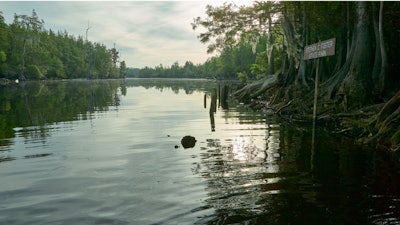
SAVANNAH, Ga. (AP) — A mining company has withdrawn its request for the federal government's permission to dig up minerals near the vast wildlife refuge in the Okefenokee Swamp, saying it plans to submit a new application that proposes a smaller area for the project.
The Army Corps of Engineers disclosed last summer that it was weighing a mining permit for Twin Pines Minerals to mine for titanium dioxide less than 4 miles (6.4 kilometers) from the southeastern boundary of the Okefenokee National Wildlife Refuge.
It's the largest federally protected refuge east of the Mississippi River, covering nearly 630 square miles (1,631 sq. kilometers) near the Georgia-Florida state line. Critics feared the mining project could cause irreparable harm to the swamp's fragile ecosystem that serves as habitat to alligators, bald eagles and other protected species.
Twin Pines, based in Birmingham, Alabama, said it's not abandoning the mining proposal. Company President Steve Ingle said in a statement sent Monday to The Associated Press that a revised application is in the works.
“In an effort to be even more conservative in our approach than we were in our initial application, we have agreed with the U.S. Army Corps of Engineers to reduce the size of the permit area and resubmit new documentation for further review and evaluation as soon as possible,” Ingle said.
The Twin Pines proposal came 20 years after chemical giant DuPont abandoned plans to mine outside the Okefenokee amid staunch opposition from environmentalists and the administration of then-President Bill Clinton.
Twin Pines wants to mine titanium dioxide that is primarily used to produce white pigment for paints and paper.
The application the company withdrew Friday sought permits to mine on a sandy ridge that serves as the eastern edge of the giant bowl-like depression that holds water in the swamp. The plan initially called for mining on about 4 square miles (10 square kilometers), but the company said it eventually wanted to expand to about 19 square miles (49 square kilometers).
The U.S. Fish and Wildlife Service said in a letter to the Army Corps that there's “great uncertainty” surrounding how mining deep into the sandy soil might reduce or otherwise alter the ridge's ability to hold water. That's because the soil would lose its distinct layers after it's scooped at average depths of 50 feet (15 meters). Once minerals are removed, the soil would be returned to the ground as a homogenized mixture.
“The Service cannot definitively say that the mining proposal will significantly affect the environment,” the agency said in a letter to the Army Corps dated Oct. 8. “However we have concerns that the proposed project could pose substantial risks for adverse impacts to (the Okefenokee refuge) and the surrounding environment that may be irreversible even with mitigation.”
The company last week released a 91-page report detailing its own scientific studies that concluded "the proposed mining activities will have negligible impact on the hydrologic system of Trail Ridge and the Okefenokee Swamp.”
Billy Birdwell, an Army Corps spokesman in Savannah, said it's not uncommon for applicants to withdraw and later resubmit updated permit proposals with added information. Depending on how much Twin Pines' updated application differs from the previous one, the agency may not have to seek a new round of public comments or otherwise restart the permitting process, Birdwell said.
“That sort of thing happens often enough that we consider it routine,” Birdwell said.






















